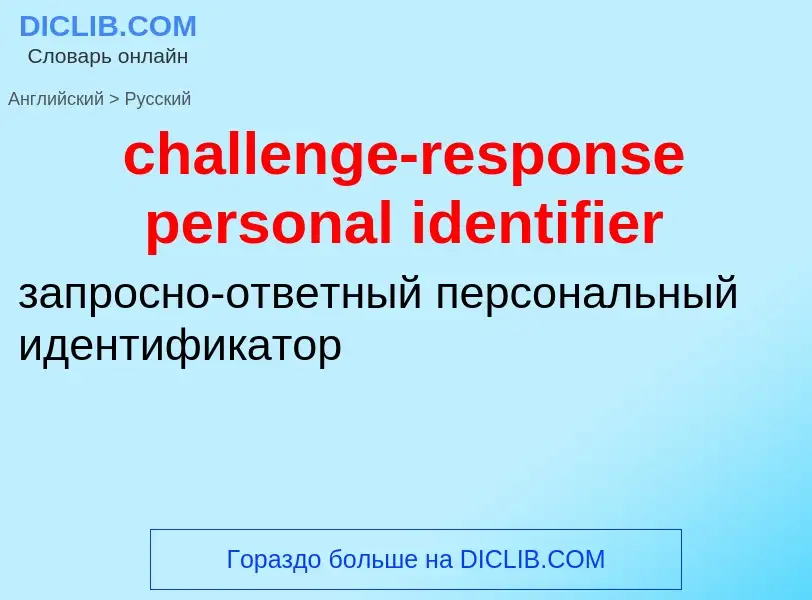Tradução e análise de palavras por inteligência artificial ChatGPT
Nesta página você pode obter uma análise detalhada de uma palavra ou frase, produzida usando a melhor tecnologia de inteligência artificial até o momento:
- como a palavra é usada
- frequência de uso
- é usado com mais frequência na fala oral ou escrita
- opções de tradução de palavras
- exemplos de uso (várias frases com tradução)
- etimologia
challenge-response personal identifier - tradução para russo
общая лексика
реакция на введение разрешающей дозы
Wikipédia
In computer security, challenge–response authentication is a family of protocols in which one party presents a question ("challenge") and another party must provide a valid answer ("response") to be authenticated.
The simplest example of a challenge–response protocol is password authentication, where the challenge is asking for the password and the valid response is the correct password.
An adversary who can eavesdrop on a password authentication can then authenticate itself by reusing the intercepted password. One solution is to issue multiple passwords, each of them marked with an identifier. The verifier can then present an identifier, and the prover must respond with the correct password for that identifier. Assuming that the passwords are chosen independently, an adversary who intercepts one challenge–response message pair has no clues to help with a different challenge at a different time.
For example, when other communications security methods are unavailable, the U.S. military uses the AKAC-1553 TRIAD numeral cipher to authenticate and encrypt some communications. TRIAD includes a list of three-letter challenge codes, which the verifier is supposed to choose randomly from, and random three-letter responses to them. For added security, each set of codes is only valid for a particular time period which is ordinarily 24 hours.
A more interesting challenge–response technique works as follows. Say Bob is controlling access to some resource. Alice comes along seeking entry. Bob issues a challenge, perhaps "52w72y". Alice must respond with the one string of characters which "fits" the challenge Bob issued. The "fit" is determined by an algorithm agreed upon by Bob and Alice. (The correct response might be as simple as "63x83z", with the algorithm changing each character of the challenge using a Caesar cipher). In the real world, the algorithm would be much more complex.) Bob issues a different challenge each time, and thus knowing a previous correct response (even if it is not "hidden" by the means of communication used between Alice and Bob) is of no use.


![Carnegie]] sponsorship era Carnegie]] sponsorship era](https://commons.wikimedia.org/wiki/Special:FilePath/2009 Challenge Cup logo.jpg?width=200)
![St Helens]] St Helens]]](https://commons.wikimedia.org/wiki/Special:FilePath/Challenge cup 1897.jpg?width=200)
![Challenge Cup logo during the [[Powergen]] sponsorship era Challenge Cup logo during the [[Powergen]] sponsorship era](https://commons.wikimedia.org/wiki/Special:FilePath/Challnge Cup logo.jpg?width=200)


![[[Wembley Stadium]] before the [[2011 Challenge Cup Final]] [[Wembley Stadium]] before the [[2011 Challenge Cup Final]]](https://commons.wikimedia.org/wiki/Special:FilePath/Wembley Stadium (49789469466).jpg?width=200)
